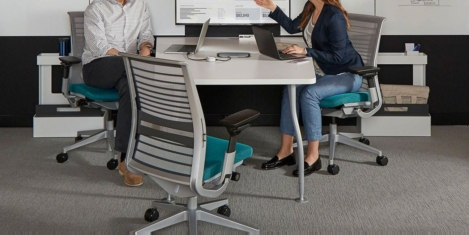April 25, 2017
Study confirms effect of workplace autonomy on wellbeing and job satisfaction 0
 New research into workplace culture has found that employees with higher levels of autonomy in their work reported positive effects on their overall wellbeing and higher levels of job satisfaction. Researchers at the University of Birmingham Business School examined changes in reported well-being relative to levels of autonomy using two separate years of data for 20,000 employees from the Understanding Society survey. The research, published in the journal Work and Occupations, found that levels of autonomy differed considerably between occupations and by gender. Those working in management reported the highest levels of autonomy in their work, with 90 percent reporting ‘some’ or ‘a lot’ of autonomy in the workplace. The finding backs up research from Cass Business School, the German Institute for Economic Research, Abraham Maslow and elsewhere.
New research into workplace culture has found that employees with higher levels of autonomy in their work reported positive effects on their overall wellbeing and higher levels of job satisfaction. Researchers at the University of Birmingham Business School examined changes in reported well-being relative to levels of autonomy using two separate years of data for 20,000 employees from the Understanding Society survey. The research, published in the journal Work and Occupations, found that levels of autonomy differed considerably between occupations and by gender. Those working in management reported the highest levels of autonomy in their work, with 90 percent reporting ‘some’ or ‘a lot’ of autonomy in the workplace. The finding backs up research from Cass Business School, the German Institute for Economic Research, Abraham Maslow and elsewhere.














 Accommodation and food services, manufacturing, and transport industries will be hardest hit by limits on movement of EU and non-EU workers following Brexit, a new report has claimed. The latest edition of Mercer’s
Accommodation and food services, manufacturing, and transport industries will be hardest hit by limits on movement of EU and non-EU workers following Brexit, a new report has claimed. The latest edition of Mercer’s 
 Gig economy workers are as likely to be satisfied with their work as workers in traditional employment, according to a major new survey published today by the CIPD which provides the first robust estimate of the size of the gig economy. Currently, 4 percent of UK working adults aged between 18 and 70 are working in the ‘gig economy’, which means approximately 1.3 million people are engaged in ‘gig work’ according to ‘To gig or not to gig: Stories from the modern. The report, which is based on a survey of 400 gig economy workers and more than 2,000 other workers, as well as 15 in-depth interviews with gig economy workers found that nearly two-thirds (63 percent) believe the Government should regulate to guarantee them basic employment rights and benefits such as holiday pay. But the research also found that, contrary to much of the rhetoric, just 14 percent of respondents said they did gig work because they could not find alternative employment.
Gig economy workers are as likely to be satisfied with their work as workers in traditional employment, according to a major new survey published today by the CIPD which provides the first robust estimate of the size of the gig economy. Currently, 4 percent of UK working adults aged between 18 and 70 are working in the ‘gig economy’, which means approximately 1.3 million people are engaged in ‘gig work’ according to ‘To gig or not to gig: Stories from the modern. The report, which is based on a survey of 400 gig economy workers and more than 2,000 other workers, as well as 15 in-depth interviews with gig economy workers found that nearly two-thirds (63 percent) believe the Government should regulate to guarantee them basic employment rights and benefits such as holiday pay. But the research also found that, contrary to much of the rhetoric, just 14 percent of respondents said they did gig work because they could not find alternative employment.





 Employees would like more freedom and flexibility at work with over half believing that the structure and culture of their workplaces are holding them back from doing their job more effectively (55 percent and 53 percent respectively). That’s according to new research from ILM, which has launched a new
Employees would like more freedom and flexibility at work with over half believing that the structure and culture of their workplaces are holding them back from doing their job more effectively (55 percent and 53 percent respectively). That’s according to new research from ILM, which has launched a new 







April 3, 2017
Brexit should be a chance for the UK to enshrine employment rights 0
by Chris Rowley • Comment, Legal news, Workplace
(more…)